Under the title “Imaginary borderlands ‘Othering’ and ‘Domestic Others’ on Post-Soviet Frontiers”, the Centre for Applied Anthropology invited to Kyiv with the guiding question “what does ‘othering’ mean in the post-Soviet context?” They wisely chose not to make a sharp distinction between othering that occurs between states and the othering of certain groups within individual countries. The organizers argued in their call that the borderland topic gained urgency in a time when “political elites use the idea of ‘common cultural heritage’ or ‘common history’ to revise the borders of another state”. They, without doubt, had in mind the annexation of Crimea and the peddling of Russkiy Mir in Eastern Ukraine. The warrying countries in question here both point to a hand-picked selection of cultural traits that people on both sides of a shifting border share. For a program dealing with such politically charged questions, it was refreshing to see on the list of speakers scholars from research institutions in neighbouring countries, including the one that attempts to shift Ukraine’s borders at present.
There was an excitingly wide range of topics and speakers with widely varying backgrounds. Topics ranged from the concept of human security in Japan presented by Dinil Pushpalal from Tohoku University to the LGBTIQ as a ‘domestic other’ in Ukrainian society.
The conference was also meant to serve a wider agenda than the exploration of what ‘othering’ means. It’s the Centre for Applied Anthropology’s declared goal to establish the discipline of social anthropology in Ukraine’s education and research institutions. This goal brings up the question whether the discipline in its Anglo-Saxon form can exist alongside Etnografiya, the discipline’s closest match in post-Soviet universities, or whether one of them would have to make space for the other. The conference program with its mix of older and younger researchers, with speakers coming from a string of universities from the UK via Ukraine to Japan, promised to become a quest for synergies between the two forms of looking at human societies. Ignacy Jóźwiak from the University of Warsaw brought up this quest for synergies in his talk about ‘hierarchies of knowledge’ between western and post-Soviet academia. Many young scholars, he observed, would do research in Eastern Europe, reading the English language literature about the region with a veracious appetite but hardly realizing that there are universities and research institutions in the region that themselves contribute a great variety of literature. The reaction from the audience to this remark suggested that Jóźwiak was up to something here. The conversations between panels revealed a group so polyglot that one can hardly blame the overlooking of domestically produced literature on language barriers alone. However, the use of ‘native-scholarship’ makes a foreigner’s research not just richer but also more heterogeneous and thereby more complicated. PhD students in western universities may often not lack the language skills it takes to read through stacks of locally produced literature but the time it takes to resolve the contradictions that arise between this set of literature and the classics of their disciplines.
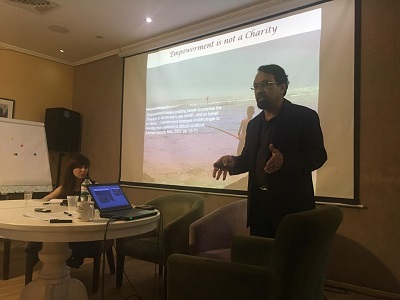 PRESENTATION The Concept of Human Security by Dinil Pushpalal (Tohoku University, Japan)
PRESENTATION The Concept of Human Security by Dinil Pushpalal (Tohoku University, Japan)
Another noteworthy hierarchy was pointed out in the talk of Justyna Szymańska, also from the University of Warsaw, about her study of civil society in wartime Kramatorsk. She pointed out that what counted as civil society in the city was determined by foreign charities that dominate the city with their grant money. At the same time local initiatives that never attract foreign funding remain invisible. Szymańska mentioned the example of flat owner associations that organize the maintenance of green spaces between apartment buildings. Although such initiatives are vital in a city devastated by war, they are hardly counted as civil society nor do they declare themselves as civil society. This hierarchy is particularly significant to the application in ‘applied anthropology’. It underscores the core strength of social anthropology, the attention to local detail and making the connection to the bigger picture of social relations in society as a whole. With this sort of attention, applied anthropology could help the wealth of grant money currently available in Ukraine finding its way to local initiatives.
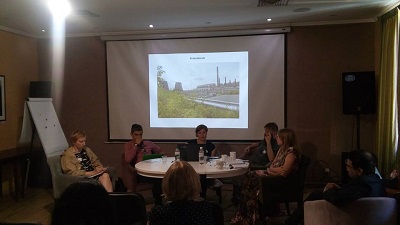 PANEL Invisible Borders and Imaginary Others in Post-Communist Hierarchies of Knowledge
PANEL Invisible Borders and Imaginary Others in Post-Communist Hierarchies of Knowledge
Another presentation that demonstrated how anthropology and its methods can prove useful in a war-torn society came from Darya Tsymbalyuk, currently at the NGO Donbas Odyssey (and soon to move to the University of St Andrews). In the Donbas Odyssey project, classical anthropological research methods, biographical interviews and mental mapping, were used to create an exhibition that reveals the subtle form of othering of internally displaced people from Donbas. Sometimes it is just the reduction of someone’s identity to their flight from troublesome Donbas to safer regions that makes a person a domestic other. Letting people lay out the facts of their displacement and their own perception of this fate, hands them back control over their own story. This also returns to them the sort of agency somebody portrayed exclusively as a victim does not have.
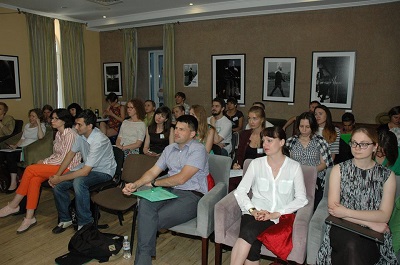
These and many other contributions showed that anthropological research can be an important contribution in understanding the categories we live by, including the category of those who do not belong, those who are perceived as the ‘other’. The post-Soviet brand of Etnografiya remains institutionally tied to faculties of history, a fact that quite naturally orients the discipline towards the past. While trying to document the ‘authentic’ cultural forms believed to be threatened by cultural influences from the outside, the discipline often remains blind for the coining of new cultural forms in the present. It often ends up declaring one way of living as authentic and another way of living as a deviation and thereby itself can do quite a bit of ‘othering’.
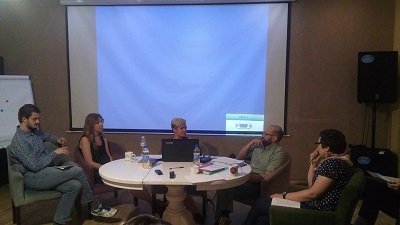
PANEL ‘Domestic Others’ in Competing Discourses of Ukrainian Crisis (2014 - 2018)
But then again, one of the keynote lectures, Mathijs Pelkmans’ talk about shifting identities along the Georgian-Turkish border, showed that history and anthropology, if combined in the right way, can provide a great toolkit to shed light on changing identities. Pelkmans, who is associate professor at the London School of Economics, went back to research he conducted around the turn of the century in several villages on Georgia’s southern border. His combination of methods from both history and ethnography allowed him to retrace how people adjusted their identities and their relation to the ‘other’ across the border according to the tune of the dominant political force at different times.
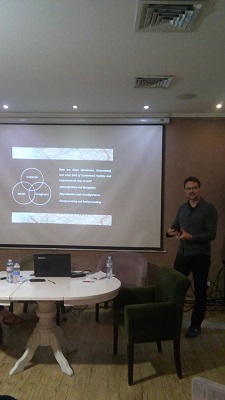
KEYNOTE LECTURE Ambiguity and Clarity in the Georgian-Turkish Borderland by Mathijs Pelkmans (London School of Economics, UK)
One conclusion to be taken from this conference was that there are many ways of applying anthropological insights for the benefit of a transforming society. What all these forms of application have in common is firstly that they are self-reflexive and try to question the categories they work with. This can help avoiding forms of ‘othering’. Secondly, all forms of applied anthropology will likely hinge on deep analysis of local particularities that are often overlooked by big number studies or by sweeping historical studies of states and nations. Finally, applied anthropology should nevertheless be attentive to the historical conditions that formed today’s local particularities. These three elements of applied anthropology were highlighted exemplarily in the centre’s Kyiv conference.
Simon Schlegel
Dr. phil., NGO ‘Eastern-Ukrainian Centre for Civic
Initiatives’

